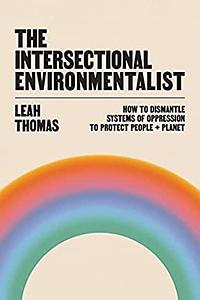You need to sign in or sign up before continuing.
Take a photo of a barcode or cover
551 reviews for:
The Intersectional Environmentalist: How to Dismantle Systems of Oppression to Protect People + Planet
Leah Thomas
551 reviews for:
The Intersectional Environmentalist: How to Dismantle Systems of Oppression to Protect People + Planet
Leah Thomas
A necessary introduction to intersectionalism from the environmental movement perspective.
hopeful
informative
inspiring
reflective
fast-paced
a great introductory toolkit to intersectional environmentalism if you’ve never dove into it before.
challenging
hopeful
informative
inspiring
medium-paced
A really nice introduction to intersectionality, and how race impacts environmental concerns. The first chapter describing intersectionality was really well done, and would be a great excerpt for folks to understand the idea. The second chapter on environmentalism also such a good stage. The book is short, easy to read, encouraging, great for folks who are Just learning about these ideas.
This book was really well written and easy to get through. I was worried it would be dense and sciencey, which it does get detailed at times, but never in a too-dry, too-text-booky way. This is a really good place to start, especially since this book is so recently published, and I look forward to checking out resources from the back of the book too.
informative
fast-paced
informative
medium-paced
informative
inspiring
fast-paced
Great tool kit for rising intersectional environmentalists, very well organized and accessible to all.
informative
medium-paced
hopeful
informative
inspiring
reflective
fast-paced
Graphic: Racism, Colonisation
This is a great starting point for anyone relatively new to concepts like intersectional theory or environmental justice. However, I wouldn't recommend it to someone working in this space already. This felt more like something I'd give a teenager or someone in their first year of uni.
Ironically, it also wasn't as intersectional as I was hoping. The content of the book is centred around the African-American experience. This isn't a bad thing by any means but as an Australian, it's not what I was looking for. It's not until chapter 4 (and after page 130!) that any real time is devoted to indigenous people or people from Asia, Latin America or the South Pacific.
I would have also liked to see a stronger focus on how people with disabilities and the queer community are impacted by issues like climate change and environmental degradation.
The toolkit at the end is more practical and I appreciated the discussion questions at the end of each chapter, which at times were more thought provoking than the content itself!
Great if you're dipping into intersectional environmentalims for the first time but not so much for a seasoned reader in this topic.
Ironically, it also wasn't as intersectional as I was hoping. The content of the book is centred around the African-American experience. This isn't a bad thing by any means but as an Australian, it's not what I was looking for. It's not until chapter 4 (and after page 130!) that any real time is devoted to indigenous people or people from Asia, Latin America or the South Pacific.
I would have also liked to see a stronger focus on how people with disabilities and the queer community are impacted by issues like climate change and environmental degradation.
The toolkit at the end is more practical and I appreciated the discussion questions at the end of each chapter, which at times were more thought provoking than the content itself!
Great if you're dipping into intersectional environmentalims for the first time but not so much for a seasoned reader in this topic.









